Iranian Student Coalition Denounces Islamic Republic's ‘Warmongering’
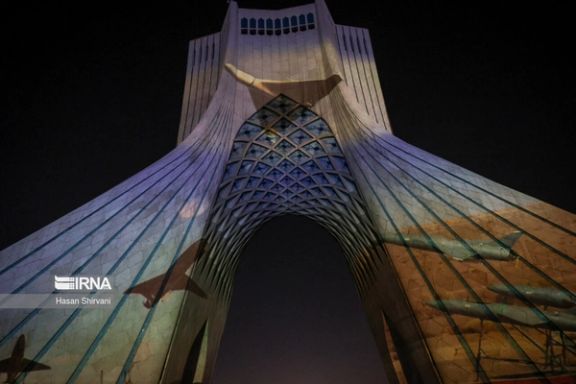
A group of student activists and student collectives from various universities in Iran have condemned the recent missile and drone attack on Israel.

A group of student activists and student collectives from various universities in Iran have condemned the recent missile and drone attack on Israel.
In a joint statement released earlier today, the student coalition denounced the Islamic Republic regime’s “warmongering” and stated: "...we, the people of Iran, are currently at war with the Islamic Republic, and we must overthrow the Islamic government and win the revolution of Woman, Life, Freedom."
The coalition is comprised of students from several universities in Esfahan, Tehran, Shiraz, Urumieh, Sanandaj, and Malayer.
Criticism is leveled at the government for its domestic repression and its support of its proxy Islamist groups in the region. Despite the regime's claim of military prowess, particularly in missile technology, the statement contends that such displays have become a subject of ridicule both domestically and internationally.
The students also call on the Iranian diaspora to urge “world governments to recognize the demands of the people of Iran” and “list the IRGC as a terrorist entity globally."
They further ask for a “boycott of the Islamic Republic from International forums" and “expulsion of ambassadors of the Islamic Republic worldwide".
Finally, the coalition asks for the international community to recognize the Islamic Republic as “a gender apartheid government where women are considered second class and queers (LGBTQIA+) have no right to live at all.”
In response to the escalating threat of conflict, the coalition calls for a unified push to advance the struggle against the regime in Iran. This includes a call to action for widespread protests, strikes, and demonstrations across all sectors of Iranian society.
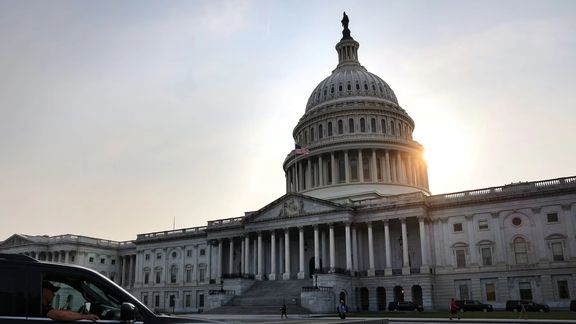
Several Iran-related bills passed the committee stage of the US Senate Tuesday that enhance sanctions on Iran’s leaders and require the President to sanction ships, ports, and refineries carrying or processing Iranian oil.
The bills have to pass a full Senate vote and be signed by the President to become law. But their sponsors were relieved to see their measures finally get over the Senate Foreign Relations Committee (SFRC) hurdle.
“I'm glad my End IT Act, the SHIP Act, and the MASHA Act passed out of committee today,” Senator Jim Risch (R-Idaho), ranking member of the Senate Foreign Relations Committee, posted shortly after the closed door committee meeting. “The Middle East is in unprecedented turmoil and weak U.S. policy has failed to re-establish deterrence with Iran. It’s past time to act, and Congress has a role to play.”
Of the bills that were marked up in the SFRC Tuesday, MAHSA Act was perhaps the most watched and the most controversial, having been held back from the committee for a long time after it passed the House –and now said to be heavily ‘diluted’ before being sent to the floor for vote.
The bill, titled the Mahsa Amini Human Rights and Security Accountability Act, was first introduced to the US Congress in January 2023, four months after the start of nationwide protests in Iran. The bill was a response to the regime’s brutal crackdown of the uprising, and was named after the young woman whose killing by the police started it all.
In its original version, the Mahsa Act required the US government to impose applicable sanctions on Iran’s Supreme Leader, Ali Khamenei, his Office and his appointees, Iran’s president and a number of entities affiliated with Khamenei. It also required the US President to report to Congress every year whether those officials should remain under existing sanctions, making it much harder for the current and future administrations to unilaterally lift the sanctions.
“The marked up Senate version of the MAHSA Act that passed today is not the real MAHSA Act that passed the House almost unanimously with 410 votes,” wrote Nick Nikbakht, an Iranian-American businessman and activist, on X . “I have been informed that Senator Cardin has fundamentally changed the bill to dilute and give Biden admin loopholes to not apply any sanctions against the terrorist regime in Iran!”
Senator Cardin (D-MD), chairman of the SFRC has been criticized by Iranian-American activists and critics of Joe Biden for his delay in handling of the MAHSA Act. The other bills marked up by Cardin Tuesday seem to have passed without much change.
Less discussed but perhaps no less consequential is the Stop Harboring Iranian Petroleum Act (SHIP Act), which Imposes sanctions on ports and refineries that process Iranian oil in violation of US sanctions.
The other bills that passed the SFRC Tuesday were the MISSILES Act and the End Iranian Terrorism Act (END IT Act) –the former sanctioning those involved in Iran's missile or drone programs, and the latter makes it harder for US administrations to issue sanction waivers to Iran, as long as it “funds terrorism.”
Collectively, these acts are seen not just as attempts to pressure the Iranian regime, but as reactions to Biden’s Iran policy, which his critics in the Congress say is too forgiving.
“Iran, unchecked by the Biden Administration’s policies of appeasement, has expanded its global operations,” Senator Risch said last week. “It is past time the Biden Administration changed course and aggressively targeted Iranian assets. It would not be that tough to do… but they have a different view of Iran than our side does.”

The Israeli military has confirmed that a senior Hezbollah commander, Ismail Yousef Baz, has been killed in an airstrike.
According to the IDF, Baz was active in planning and carrying out both rocket and antitank missile attacks against Israel from the Lebanese coastal area.
Baz, equated in rank to a brigade commander, had been a long-standing figure in Hezbollah's military operations. The IDF described him as a "senior and veteran official" within the terror organization, having held several pivotal roles.
Hezbollah launched two drones laden with explosives towards northern Israel to target an Iron Dome missile defense battery on Tuesday. The drones struck near the community of Beit Hillel, slightly injuring three people. Social media footage appeared to show one of the drones flying over the Galilee Panhandle.
In response, Israeli forces conducted a drone strike on a vehicle in Ain Baal near Tyre, approximately 15 kilometers from the Israeli border.
Hezbollah, known for its backing by Iran, along with other Palestinian groups like Hamas and Palestinian Islamic Jihad, has intensified its operations against Israel. The IDF reported that Baz was the sixth officer of his rank eliminated in recent operations, with over 30 Hezbollah commanders reportedly killed in the past six months.
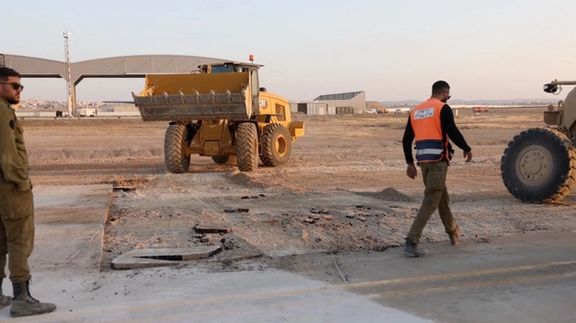
Iran International was authorized to film and report from the Nevatim Air Base in Israel after the Iranian military claimed that the base had been severely damaged during the failed weekend drone and missile attack.
Contradicting remarks by the Islamic Republic's armed forces chief, who claimed that the attack had achieved all of its objectives, IDF spokesperson Rear Adm Hagari who accompanied Iran International's reporter to the airbase stated that the facilities had sustained minimal damage. Video footage shows that there was minor damage to non-critical areas in the base, while F-35 warplanes were seen taking off.
Hagari explained that the only place that has suffered some damage to its infrastructure during Iran’s attack is this airbase which is “fully in operation”.
“The Islamic Republic is lying. All the money that Iran spent on this attack resulted only in this pit”, The IDF spokesman said, showing a cavity in the ground next to an unfinished concrete structure.
Iran launched hundreds of ballistic and cruise missiles as well as drones at Israel on Saturday. However, the Israeli Defense Forces confirmed that some 99% of the incoming projectiles were downed, and those that survived caused only minor damage.
As reported by the IDF, the Israeli Air Force successfully intercepted and destroyed 170 drones and 30 cruise missiles outside the country's borders.
Another factor contributing to the limited impact was that US, UK, French, and Jordanian jets flying over the region and downing Iranian drones and cruise missiles.
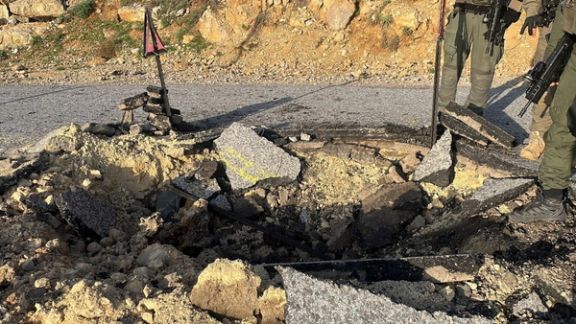
In addition, Arab nations such as Saudi Arabia and the United Arab Emirates provided intelligence assistance to the defensive operation, as reported by the Wall Street Journal.
As this is the first time Iran has attacked Israel from its soil, the threat of a wider conflict in the region has been raised.
Until now, Israel has stated that the Iranian attack on its soil "will be met with a response", but has not provided further details. The Israeli war cabinet has made three times to decide about a potential response. Israel's Western allies have urged restraint, concerned about a further escalation in the region.
Israel Army Chief of Staff Gen. Halevi stated in a video statement that Iran will face the consequences of its actions. “We will choose our response accordingly."

The Iranian Chief of Staff of the Armed Forces, Major General Mohammad Bagheri, called the recent attack on Israel a "historical and proud operation."
He said that the aerial bombardment represents a new level of military capabilities and a new defense policy of Iran against the world, not acknowledging the fact that 99 percent of the 350 plus drones and missiles were intercepted by Israel and its allies.
An Israeli Defense Forces (IDF) spokesperson said all of the 170 drones and 30 cruise missiles were destroyed before reaching the borders of Israel, and most of the 120 ballistic missiles were intercepted with the help of Israel's long-range Arrow air defense system.
Meanwhile, the firebrand Tehran Friday Prayer Leader, Ahmad Khatami, said on Tuesday that: "After the IRGC attacked Israel, they scared the people, saying Israel will do this and that to them. But they couldn’t do anything. Even in the Security Council, they were unable to pass a resolution."
The United Nations Security Council held a special session in New York on Sunday over the attack but refrained from condemning Iran's activities.
US Ambassador Robert Wood called on the council to speak out against "aggressive actions" from Iran, while asking for an end to attacks by the Islamic Republic, its partners, and proxies. No resolution was offered, and the session ended without an agreed-upon formal statement or vote.
The bombardment was a retaliation for the April 1 alleged Israeli air strike on the Iranian consulate in Damascus which killed two senior Quds Force commanders and several IRGC personnel. Iran said the attack on Israel was a legitimate means of self defence following the Syria strike. Israel has not taken credit for the operation.
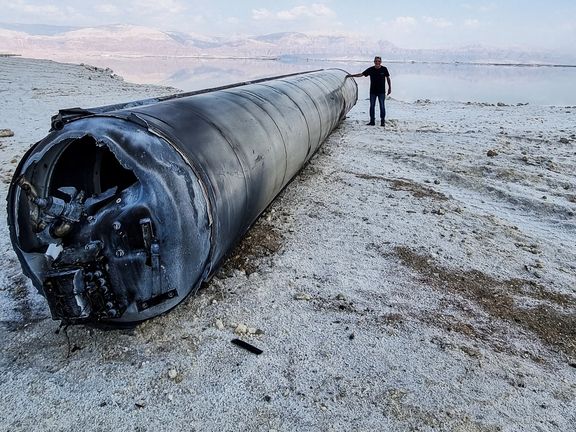
Wreckage from Iranian missiles and drones destined for Israel has been discovered across Iraq following Saturday night’s foiled bombardment.
Over the weekend, US-led coalition forces in Iraq successfully intercepted dozens of the projectiles, a source close to the Iraqi government told The National.
The majority of the Iranian drones and missiles were shot down above key areas including Baghdad, Najaf, and the semi-autonomous Kurdish region in northern Iraq.
US anti-missile systems stationed at the Ain Al Asad airbase in Anbar province were pivotal in neutralizing the airborne threats. Additionally, a US Patriot battery in the Kurdish region intercepted at least one ballistic missile, which subsequently crashed in the Soran district near Erbil.
Following the attack, which involved more than 300 drones and missiles launched by Iran towards Israeli territory, the Iraqi landscape was littered with remnants of the intercepted weapons. Notably, parts of a drone were found in an open area outside Najaf. No casualties have been reported from the incident, another official said.
Along with the US, Israel was aided by the UK, Jordan and France in the mission to intercept the barrage.
The Iranian offensive came in retaliation to an Israeli airstrike on April 1 on Tehran's consulate building in Damascus, which resulted in the death of two high-ranking Iranian military officials plus other IRGC personnel.
Despite the chaotic aftermath, the Iraqi government has yet to issue a formal denunciation of Iran’s use of its airspace for the attacks.
A spokesman for the Iran-backed Al Nujaba militia in Iraq criticised Baghdad after the attack, saying the intervention of US forces "undoubtedly embarrasses the Iraqi government, which seeks to take a clear position on the American military presence" in the country.
The US Central Command said it “successfully engaged and destroyed” more than 80 one-way attack drones and at least six ballistic missiles intended to strike Israel from Iran and Yemen. It was the first direct attack from Iranian soil to target the Jewish state after years of shadow warfare.






